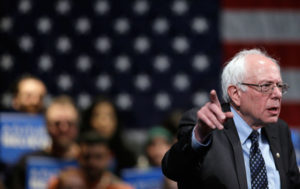AIPAC Has Bernie Sanders in Its Crosshairs
He could become America's first Jewish president, but the pro-Israel lobby is more concerned with his take on Palestine than his religion. Screen shot / Facebook
Screen shot / Facebook
Bernie Sanders, who made history with his 2016 presidential campaign as the first Jewish American to win a presidential primary and receive an electoral vote for president, is bizarrely being targeted with Facebook ads by The American Israel Public Affairs Committee (AIPAC). Certainly, it seems at best counterintuitive for the pro-Israel lobby to be working against a candidate who could become the first Jewish president in U.S. history. As The Intercept reports, the only other Democrat AIPAC is targeting with Facebook ads is Rep. Ilhan Omar, who has come under fire for being openly critical of Israel’s occupation and supporting the Boycott, Divestment and Sanctions (BDS) protest movement.
The sponsored ads about Omar and Sanders are similar in content. While AIPAC’s posts about Sanders, which are being run in California, Florida and Texas—three states with democratic primaries that will be crucial in deciding the party’s 2020 candidate—contain petitions with appeals like, “Tell Sen. Sanders: America stands with Israel,” those targeting Omar feature the somewhat stronger-worded variation, “Tell Rep. Omar: We will not be deterred.”
Sanders and Omar have vastly different takes on Israel. Yet Sanders, who says he “being Jewish is so much of what I am” and publicly expresses his support for Israel’s existence, has been credited with moving the Democratic Party further left on the issue. The Intercept’s Robert Mackey outlines some of the Vermont senator’s comments on Israel:
Sanders, whose father’s family in Poland was nearly wiped out in the Holocaust, has been a frequent critic of Israeli policy. During the 2016 campaign, he called Israel’s use of force during its bombardment of Gaza in 2014 — killing at least 1,473 civilians, including 501 children — had been “disproportionate” and “indiscriminate.”
After he was denounced by Israeli politicians for supposedly giving comfort to Hamas, he told CNN that he favored “a more balanced position” on the Israeli-Palestinian conflict. “Israel has a right to live in freedom, independently and in security without having to be subjected terrorist attacks,” he said, “but I think that we will not succeed to ever bring peace into that region unless we also treat the Palestinians with dignity and respect.”
During an interview with the Daily News editorial board that year, Sanders — who lived on a kibbutz as a young man and has relatives who still live in Israel — frankly criticized another aspect of Israeli policy, the building of Jewish-only settlements in the occupied West Bank, as a violation of international law. Asked if he would insist on the evacuation of settlements as president, Sanders replied: “I think if the expansion was illegal, moving into territory that was not their territory, I think withdrawal from those territories is appropriate.” … Last year, Sanders defended the right of Palestinians to demonstrate after Israeli snipers opened fire on unarmed protesters in Gaza.
Last month, it was headline news in Israel when the Sanders campaign released video of his supporter Shaun King saying the senator “spoke out against apartheid in South Africa when crazily that was an unpopular thing to do and even today he speaks out against apartheid-like conditions in Palestine even though it’s not popular.”
And Sanders denounced Israel’s prime minister, Benjamin Netanyahu, in an interview with NBC News on Sunday in Iowa. “When election time comes in Israel, he always tries going even further to the right by appealing to racism within Israel, I think it’s unfortunate,” Sanders said ahead of Tuesday’s election in Israel. “I’m not a great fan of his, and, frankly, I hope he loses his election.”
But, as Mackey points out, Sanders has also been criticized for not taking an even stronger stance against the Israeli occupation and supporting the BDS movement, as can be seen in the following AJ+ interview where Sanders restates his belief in the possibility of two-state solution. According to Sanders, a one-state solution, “would be the end of the state of Israel, and I support Israel’s right to exist.” He also explains why his signature appeared alongside that of every other U.S. senator on a letter to the United Nations that claimed the international organization is being “exploited as a vehicle for targeting Israel.”
As the Israeli government, led by Benjamin Netanyahu, a man who has openly sided with U.S. Republicans, tacks even further toward the hard right, the time is ripe for an open, multi-faceted debate about the U.S.’ approach to Israel, a country that has for many years received seemingly blind bipartisan support. Sanders isn’t the only 2020 candidate who’s been critical of Israel’s recently re-elected leader, but it can be argued, he’s taken the lead among prominent Democrats in discussing the Mideast nation’s increasingly hard-line approach toward Palestine.
Perhaps with a Jewish candidate as a current front-runner for the 2020 democratic candidacy and a Republican president who has moved the U.S. embassy to Jerusalem and recognized the disputed Golan Heights as part of Israel, the conversation is inevitable. Lucky for Democrats, who, according to a 2018 poll, have become increasingly sympathetic to the plight of Palestinians, the man at the center of this debate at the very least has a more nuanced position on the issue than many of his Democratic peers. When you think of it in these terms, the decision made by AIPAC—which, among others critical of Israel’s often brutal actions against Palestinians, has targeted anti-occupation activists—to single out the democratic front-runner starts to make a lot of sense.
Your support matters…Independent journalism is under threat and overshadowed by heavily funded mainstream media.
You can help level the playing field. Become a member.
Your tax-deductible contribution keeps us digging beneath the headlines to give you thought-provoking, investigative reporting and analysis that unearths what's really happening- without compromise.
Give today to support our courageous, independent journalists.






You need to be a supporter to comment.
There are currently no responses to this article.
Be the first to respond.